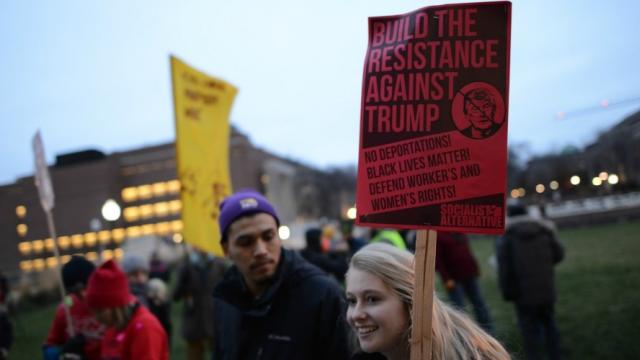
Around the country, people who woke up on November 9 shocked and galvanized by the election results are forming new local organizations and networks to resist president-elect Donald Trump's right-wing agenda.
Many of those getting involved on the local level are entirely new to political organizing, testifying to the powerful and frightening shift represented by the ascendance of an administration that critics describe as neofascist.
Some have been inspired to form local resistance groups by national efforts such as the Indivisible Guide, a call to action by former congressional staffers, and the Refuse Fascism campaign, while other organizations formed independently in response to the election results.
One of the groups formed immediately after November's election was Forward Action Michigan (FAM), a state-level group that has now also organized local chapters, whose vision is to "see equal and human rights be realized by all people, through the election of forward-thinking advocates and the implementation of inclusive legislation," one of FAM's leaders told Common Dreams in an email.
"Our group was formed in the early morning of November 9. Originally, three groups formed simultaneously and without the knowledge of the others, and we coalesced by that weekend. By Saturday, November 12, we had approximately 20,000 members. We are currently approaching 27,000," the organizer, who wished to remain anonymous, said.
The group uses Facebook to mobilize its members with daily calls to action, to publish materials on ongoing legislative activities, and to share educational materials to help members stay on top of the news as the new political reality unfolds.
"The incoming administration has fueled a new level of political activism," the organizer noted.
Indeed, as the Maine-based group Mainers for Accountable Leadership (MFAL) said in a statement Tuesday: "Most MFAL members are newly engaged in political advocacy and are getting involved now out of concern that Donald Trump's stated policies and proposals would hurt Mainers and violate our civil rights and civil liberties."
"MFAL's mission," the statement explained, "is to hold our U.S. senators and representatives accountable to the majority of Mainers who rejected the hate and bigotry filled campaign of President-elect Trump."
Most recently, the group led a "virtual protest" of Sen. Susan Collins's (R-Maine) support for Sen. Jeff Sessions (R-Ala.) as Trump's nominee for attorney general.
Meanwhile, in more right-wing regions, Trump resistors are organizing as "blue dots in a red state," as Jennifer Harding, chair of Progressive Social Network of Baton Rouge, described her Louisiana-based group in an email to Common Dreams.
Harding went on to explain the crucial role local resistance will play in the coming years: "This is why we feel local resistance is important: The election results were devastating and terrifying. People are freaked out. Politics on the national level are going to be ugly for the foreseeable future. We might not be able to influence that. But we can come together in our communities to be a counterweight to Trumpism."
"That means to act to promote inclusiveness rather than division, hope rather than cynicism, solidarity rather than me-first-ism, and to build the machinery for future political victories," Harding added.
"In this political climate, all resistance is important," an organizer with the Austin, Texas-based group Better Together ATX, wrote to Common Dreams.
"One of the problems with the modern left is that a lot of us seem to have opted out of many of the social organizations that foster these feelings of community: churches, sports leagues, neighborhood organizations...we have isolated ourselves, and it's hard to get involved without a history of involvement," the activist, who also asked to remain anonymous, went on, adding:
It's really easy to get completely demoralized by our political system and they way it's covered by the media. The news is full of stories and problems that seem insurmountable. The media wants it that way. The 'world is falling' mentality sells more advertising time. It generates more clicks. But it doesn't help people understand how to engage with the power structure. It doesn't help people get out of bed in the morning. My group—very local—does help people engage. It helps people figure out how to effectively work for those issues they believe in, and against those issues that are repugnant to them.
"I think the future is in hyper-local organization," the organizer said.
And as journalist Bonnie Darves, a self-described "inexperienced activist," wrote for Common Dreams of her new political involvement following Trump's election: "if I value my First Amendment rights to free speech and peaceful protest, I have no choice but to wrench myself from the mire of helplessness and hopelessness, stop whining and get moving."
Those interested in finding and joining a local resistance group can search the Indivisible Guide's database for an organization near them.
3 WAYS TO SHOW YOUR SUPPORT
- Log in to post comments












Comments
Jackie Jones replied on
Key Largo
Are there any groups in Upper Keys?